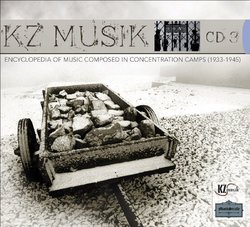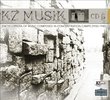| All Artists: Francesco Lotoro Title: KZ Musik: Encyclopedia of Music Composed in Concentration Camps, CD 3 Members Wishing: 1 Total Copies: 0 Label: KZ Musik Original Release Date: 1/1/2009 Re-Release Date: 7/28/2009 Genre: Classical Styles: Chamber Music, Forms & Genres, Concertos, Historical Periods, Classical (c.1770-1830), Modern, 20th, & 21st Century Number of Discs: 1 SwapaCD Credits: 1 UPC: 885150317860 |
Search - Francesco Lotoro :: KZ Musik: Encyclopedia of Music Composed in Concentration Camps, CD 3
 | Francesco Lotoro KZ Musik: Encyclopedia of Music Composed in Concentration Camps, CD 3 Genre: Classical
|
Larger Image |
CD DetailsSimilar CDs |
CD ReviewsPiano Works by Klein, Ullmann & Schul Written in Theresienst J Scott Morrison | Middlebury VT, USA | 07/29/2009 (5 out of 5 stars) "This CD is the Third Volume in a series from KZ Musik which is effectively an encyclopedia of music composed in various Nazi concentration camps during the Holocaust. All three of the composers represented on this disc wrote the present works in the 'show camp' Theresienstadt (now Terezín) and were murdered by the Nazis. This disc is devoted to solo piano works played by Francesco Lotoro who is also the director of the entire KZ Musik project.
Gideon Klein (1919-1945) was a Moravian Jew who studied with Vilém Kurz and Alois Hába. He was sent to Theresienstadt in 1941 and was later transferred to Auschwitz where he was killed in 1945. While at Theresienstadt he was an organizer of the camp's cultural life. His Piano Sonata was written in 1943 and was premiered in the camp by Pavel Stephan. Many years later it was an obligatory work at the Arthur Rubinstein Piano Competition in Tel Aviv. It is in three movements -- fast, slow, fast -- but there was probably a fourth movement that was either not finished or was lost. It is in a language somewhat reminiscent of, but not as rigorous as, that in Schoenberg's Op. 11 Klavierstücke. Viktor Ullmann (1898-1944) was killed in Auschwitz one day after being transferred there from Theresienstadt where he had been director of Freizeitgestaltung (leisure time activities). He had served as an officer in the Austrian army during World War I and been ennobled for his efforts. His music was influenced by Mahler, Zemlinsky and Schoenberg. This disc contains his Sonatas Nos. 5, 6 & 7, and cadenzas he wrote for Beethoven's Piano Concertos Nos. 1 & 3. Sonatas 5 & 7 were intended to serve as the bases for his Symphonies Nos. 1 & 2 which were never completed. There is much polytonality, complex counterpoint and fleeting references to tunes from his youth (including 'Ach, du lieber Augustin' in the first movement of the Fifth Sonata, and the Tristan 'Liebestod' in the Seventh Sonata). The last movement of the Seventh Sonata is a set of variations and a fugue on Yehuda Sharett's Jewish folksong 'Song of Rachel.' The Beethoven cadenzas were written for performances by the orchestra made up of detainees in Theresienstadt. Zikmund Schul (1916-1944) is the least known of these three composers. He had studied in Prague with Alois Hába and was briefly a student of Hindemith in Berlin. He was interested in Jewish liturgical music. His Fugue was probably started in Prague and finished at Theresienstadt. This three-minute piece is written in Hindemithian free counterpoint and sounds to be quite technically difficult. Pianist Francesco Lotoro displays his fine pianistic skills here and throughout this disc. Scott Morrison " |

 Track Listings (19) - Disc #1
Track Listings (19) - Disc #1